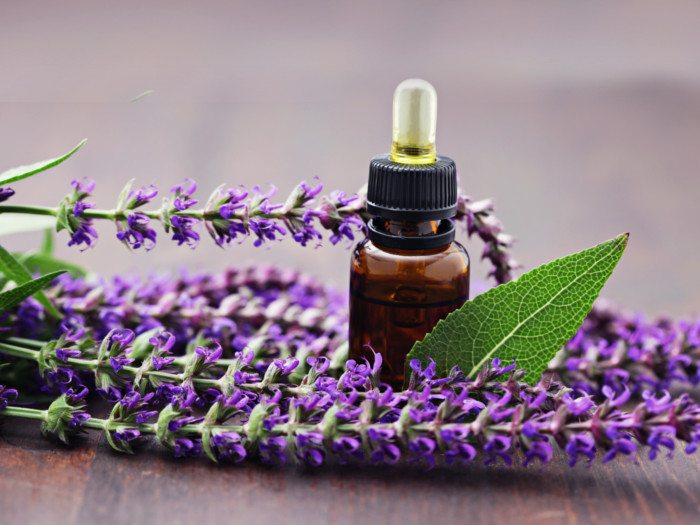Discover the remarkable health benefits of sage essential oil, a natural remedy cherished for centuries and now validated by modern science. This versatile essential oil, derived from the sage plant, has a plethora of uses ranging from skincare to internal health. As we delve into the specifics, we’ll uncover how sage essential oil is making strides in natural health, from its potent anti-fungal and anti-inflammatory properties to its emerging role in women’s health. This exploration not only highlights sage’s traditional significance but also its growing importance in contemporary wellness practices.
Sage, or Salvia officinalis, as it is known in the botanical nomenclature system, is a well-known and frequently heard name in the world of cosmetics, particularly in the field of skincare. Innumerable beauty treatment products claim that they contain the oil of sage, which is actually sage essential oil.
Health Benefits of Sage Essential Oil
This oil has a number of non-cosmetic medicinal uses which are listed below.
Potentially Contains Antimicrobial Properties
Sage essential oil is becoming a key player in the fight against tough germs resistant to many drugs. [1]
A 2017 study highlighted by the National Center for Biotechnology Information shows that when sage oil is mixed with nanoparticles, it becomes more stable and effective against these superbugs. This method makes the oil stronger and more lasting, offering a natural alternative to artificial preservatives and traditional antibiotics. [2]
With the rise of germs that are hard to treat, sage essential oil could be a game-changer in keeping our food safe and treating infections more naturally. [3]
Possible Antibacterial Properties
In the Middle Atlas of Morocco, two types of sage, Salvia lavandulifolia, and Salvia officinalis, are showing incredible potential for modern medicine. A study revealed that these sages are packed with phytochemicals, especially camphor, and have strong antioxidant properties. They’re not just good at fighting off free radicals but also effective against bacteria like Staphylococcus aureus and Candida albicans. This research opens exciting possibilities for using sage in new medicines, highlighting the plant’s ancient wisdom in meeting modern health needs. Sage oil could be a natural solution to tackle bacteria and boost our overall health. [4] [5]
Can Act As An Antioxidant
This is perhaps the most valuable aspect of this essential oil and the reason behind its extensive use in anti-aging and skin treatment products. According to a study published in the Journal of Traditional and Complementary Medicine, sage gets its potent antioxidant power from rosmarinic acid and carnosic acid. Antioxidants, as the name suggests, act against oxidants or free radicals in the body, which are the main causes of aging. [6] [7]
These antioxidants slow down aging and prevent symptoms like wrinkles, sagging skin, and muscles, reduction in vision and hearing capabilities, malfunctioning of the brain, memory loss, degeneration of tissues, macular degeneration, and nervous disorders. [8]

Sage essential oil can be used to calm the nerves. Photo Credit: Shutterstock
Possible Anti-inflammatory & Antifungal Properties
A 2017 study in the Journal of Ethnopharmacology showed that clary sage extract significantly reduced inflammation in rats, indicating potential relief for periodontitis. However, a preventive effect was not evident when applied before infection onset. [9]
The essence of Salvia officinalis L., widely used in Jordan’s traditional medicine, is backed by a study highlighting its antifungal and anti-inflammatory properties. With key components like 1,8-cineole and camphor, this oil combats specific fungal strains and diminishes inflammation markers without compromising cell health. These findings open doors for its inclusion in skincare formulations, blending cosmetic allure with pharmaceutical utility. [10]
Potentially Cholagogue & Choleretic
According to the International Journal of Biology, sage promotes the discharge of bile. Sage essential oil may help in digestion, soothing the stomach, and improving the functionality of the whole digestive system against inflammation caused by excessive acids. It may also neutralize acids in the stomach and the bloodstream, thereby providing relief from acidity and acidosis, which in turn protects us from peptic ulcers due to acidity, as well as from boils, eruptions, and skin diseases that occur when acid levels rise in the blood. However, this research was conducted on laboratory mice and human research is required to validate this claim further. [11]
Potential Emmenagogue Properties
Clary sage essential oil, derived from Salvia sclarea Linn. of the Lamiaceae family, is distinct from common sage with larger, bluish-white leaves. Rich in compounds like linalool and linalyl acetate, it’s especially beneficial for women. It regulates menstrual cycles, eases muscle cramps, and has womb-supportive properties. [12]
May Enhance Memory and Cognitive Functions
Increasing evidence suggests that S. officinalis (sage) possesses cognitive and memory-enhancing effects. Animal studies indicate its potential to boost memory retention and improve cognition, with benefits extending to diabetes-induced learning deficits and morphine-related memory impairment. Clinical trials in both healthy individuals and those with cognitive impairments have shown improvements in memory and cognitive functions following sage use. The underlying mechanism appears to involve interactions with the cholinergic system, influencing receptors and inhibiting acetylcholinesterase activity. Sage’s properties position it as a promising candidate for developing cognitive enhancement treatments. [13] [14]
Word of Caution: Being a nervous stimulant, those with epilepsy, hysteria, or a history of either, should avoid using it. Furthermore, since it contains camphor and camphene, which are toxic in nature, it should be avoided during pregnancy. [15]
Blending: Essential oil of sage blends well with the essential oils of Clary Sage, Geranium, Ginger, Lavender, Orange, Vetiver, Neroli, Rosemary, and Tea tree.
Final Thoughts
In conclusion, sage essential oil emerges as a remarkably versatile and potent natural remedy, aligning seamlessly with the wellness needs of today’s lifestyle. From its ability to combat skin conditions to its potential in managing menstrual health, sage oil stands out as a multi-faceted ally in health and wellness. Its blend of traditional wisdom and modern scientific validation makes it an invaluable addition to the health repertoire of those seeking natural, effective solutions for a range of health concerns. This exploration of sage’s benefits underscores the plant’s enduring relevance and expanding role in holistic health practices.
